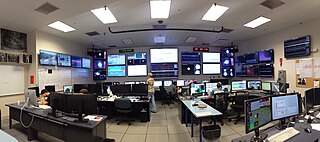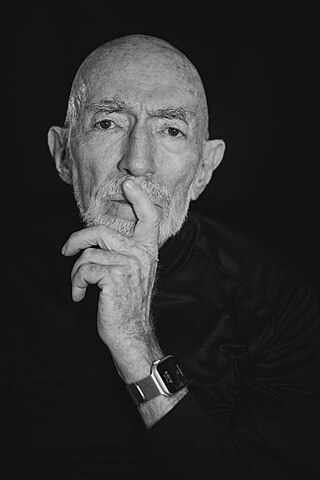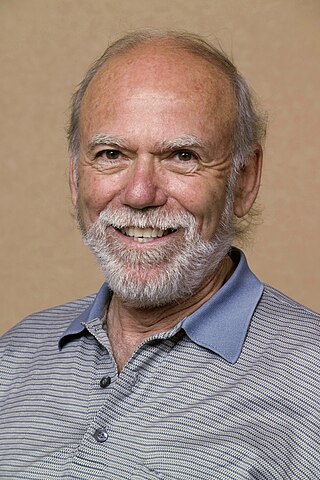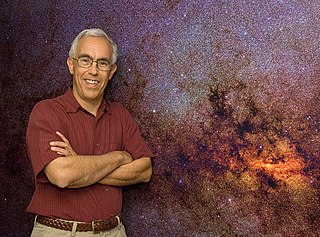Related Research Articles

The Laser Interferometer Gravitational-Wave Observatory (LIGO) is a large-scale physics experiment and observatory designed to detect cosmic gravitational waves and to develop gravitational-wave observations as an astronomical tool. Two large observatories were built in the United States with the aim of detecting gravitational waves by laser interferometry. These observatories use mirrors spaced four kilometers apart to measure changes in length—over an effective span of 1120 km—of less than one ten-thousandth the charge diameter of a proton.

Kip Stephen Thorne is an American theoretical physicist and writer known for his contributions in gravitational physics and astrophysics. Along with Rainer Weiss and Barry C. Barish, he was awarded the 2017 Nobel Prize in Physics for his contributions to the LIGO detector and the observation of gravitational waves.

Rainer "Rai" Weiss is a German-born American physicist, known for his contributions in gravitational physics and astrophysics. He is a professor of physics emeritus at MIT and an adjunct professor at LSU. He is best known for inventing the laser interferometric technique which is the basic operation of LIGO. He was Chair of the COBE Science Working Group.

Bruce Allen is an American physicist and director of the Max Planck Institute for Gravitational Physics in Hannover Germany and leader of the Einstein@Home project for the LIGO Scientific Collaboration. He is also a physics professor at the University of Wisconsin–Milwaukee and the initiator / project leader of smartmontools hard disk utility.

Ronald William Prest Drever was a Scottish experimental physicist. He was a professor emeritus at the California Institute of Technology, co-founded the LIGO project, and was a co-inventor of the Pound–Drever–Hall technique for laser stabilisation, as well as the Hughes–Drever experiment. This work was instrumental in the first detection of gravitational waves in September 2015.
Eric Poisson is a Canadian award-winning physicist specializing in the study of black holes. Poisson is a professor at the University of Guelph as well as an affiliate member of the Perimeter Institute for Theoretical Physics, in Waterloo, Ontario, Canada.
Bernard F. Schutz FInstP FLSW is an American and naturalised British physicist. He is well known for his research in Einstein's theory of general relativity, especially for his contributions to the detection of gravitational waves, and for his textbooks. Schutz is a Fellow of the Royal Society and a Member of the US National Academy of Sciences. He is a professor of physics and astronomy at Cardiff University, and was a founding director of the Max Planck Institute for Gravitational Physics in Potsdam, Germany, where he led the Astrophysical Relativity division from 1995 to 2014. Schutz was a founder and principal investigator of the GEO gravitational wave collaboration, which became part of the LIGO Scientific Collaboration (LSC). Schutz was also one of the initiators of the proposal for the space-borne gravitational wave detector LISA, and he coordinated the European planning for its data analysis until the mission was adopted by ESA in 2016. Schutz conceived and in 1998 began publishing from the AEI the online open access (OA) review journal Living Reviews in Relativity, which for many years has been the highest-impact OA journal in the world, as measured by Clarivate.

Robert Louis Byer is a physicist. He was president of the Optical Society of America in 1994 and of the American Physical Society in 2012.

Alessandra Buonanno is an Italian-American theoretical physicist and director at the Max Planck Institute for Gravitational Physics in Potsdam. She is the head of the "Astrophysical and Cosmological Relativity" department. She holds a research professorship at the University of Maryland, College Park, and honorary professorships at the Humboldt University in Berlin, and the University of Potsdam. She is a leading member of the LIGO Scientific Collaboration, which observed gravitational waves from a binary black-hole merger in 2015.
David Howard Reitze is an American laser physicist who is professor of physics at the University of Florida and served as the scientific spokesman of the Laser Interferometer Gravitational-Wave Observatory (LIGO) experiment in 2007-2011. In August 2011, he took a leave of absence from the University of Florida to be the Executive Director of LIGO, stationed at the California Institute of Technology, Pasadena, California. He obtained his BA in 1983 from Northwestern University, his PhD in physics from the University of Texas at Austin in 1990, and had positions at Bell Communications Research and Lawrence Livermore National Laboratory, before taking his faculty position at the University of Florida. He is a Fellow of the American Physical Society, the Optical Society, and the American Association for the Advancement of Science.

Barry Clark Barish is an American experimental physicist and Nobel Laureate. He is a Linde Professor of Physics, emeritus at California Institute of Technology and a leading expert on gravitational waves.

Dr. Thomas A. Prince is the Ira S. Bowen Professor of Physics at the California Institute of Technology and holds a joint appointment with Caltech’s NASA Jet Propulsion Laboratory (JPL) as a senior research scientist. Between May 2001 and June 2006, Prince was the chief scientist at JPL. He is currently the director and Allen V.C. Davis and Lenabelle Davis Leadership Chair for the W. M. Keck Institute for Space Studies at Caltech.

Nergis Mavalvala is a Pakistani-Parsi-American astrophysicist. She is the Curtis and Kathleen Marble Professor of Astrophysics at the Massachusetts Institute of Technology (MIT), where she is also the dean of the university's school of science. She was previously the Associate Head of the university's Department of Physics. Mavalvala is best known for her work on the detection of gravitational waves in the Laser Interferometer Gravitational-Wave Observatory (LIGO) project, and for the exploration and experimental demonstration of macroscopic quantum effects such as squeezing in optomechanics. She was awarded a MacArthur Fellowship in 2010.
David Ernest McClelland is an Australian physicist, with his research focused on the development of the manipulation and control of optical quantum states, and its implementation into gravitational wave observatories. He is a Fellow of the Australian Academy of Science, the American Physical Society and the Optical Society of America. Since 2001, he has been a professor at the Australian National University (ANU) in the Research School of Physics and Engineering, in Canberra (Australia). He is Director of the ANU's Centre for Gravitational Astrophysics and Deputy Director of OzGrav - the Australian Research Council Centre of Excellence in Gravitational Wave Discovery.
Norna Robertson is a lead scientist at LIGO at California Institute of Technology, and professor of experimental physics at the University of Glasgow. Her career has focused on experimental research into suspension systems and instrumentation to achieve the detection of gravitational waves.
Rochus Eugen (Robbie) Vogt is a German-American physicist, famous as the director and principal investigator of the LIGO project from 1987 to 1994.
Peter Reed Saulson is an American physicist and professor at Syracuse University. He is best known as a former spokesperson for the LIGO collaboration serving from 2003 to 2007 and research on gravitational wave detectors.

Rana X. Adhikari is an American experimental physicist. He is a professor of physics at the California Institute of Technology (Caltech) and an associate faculty member of the International Centre for Theoretical Sciences of Tata Institute of Fundamental Research (ICTS-TIFR).
Vuk Mandić is a Serbian-American astrophysicist and professor of physics and astronomy at the University of Minnesota. In 2017 he was elected a Fellow of the American Physical Society (APS).
Lisa Barsotti is a research scientist at the Massachusetts Institute of Technology Kavli Institute.
References
- ↑ biographical information according to American Men and Women of Science, Thomson Gale 2004
- ↑ "Whitcomb, Stanley E. Interview by Heidi Aspaturian. Pasadena, California, April 24, May 8 and 22, June 5 and 19, 2017". Oral History Project, California Institute of Technology.
- 1 2 "2019 Richard A. Isaacson Award in Gravitational-Wave Science Recipient, Stanley E. Whitcomb, LIGO Laboratory". APS Physics.
- 1 2 "2017 Henry Draper Medal". National Academy of Sciences.
- ↑ "Whitcomb, Stanley. Interview by Shirley K. Cohen. Pasadena, California, March 7 and 14, 1997". Oral History Project, California Institute of Technology Archives.
- 1 2 "C.E.K. Mees Medal awarded to Stanley Whitcomb". LIGO news. August 20, 2018.
- ↑ "APS Fellow Archive". APS Physics.
- ↑ "Stanley E. Whitcomb". OSA Living History.
- ↑ Smith, Meredith; Apter, Kari; Gass, Jeanette (2018-06-01). "2018 OSA Awards and Medals". Optics and Photonics News. 29 (6): 41–51. doi:10.1364/OPN.29.6.000041. ISSN 1541-3721.